Public relations professionals manage the public image of organizations and individuals. They craft and disseminate messages to the media, stakeholders, and the public to build and maintain a positive reputation.
Public relations skills include strong writing and communication abilities, media relations, crisis management, and strategic thinking. These skills help PR professionals effectively convey messages and handle public perception.
Candidates can write these abilities in their resumes, but you can’t verify them without on-the-job Public Relations skill tests.
In this post, we will explore 9 essential Public Relations skills, 11 secondary skills and how to assess them so you can make informed hiring decisions.
Table of contents
9 fundamental Public Relations skills and traits
The best skills for Public Relationss include Communication, Media Relations, Crisis Management, Social Media Management, Content Creation, Event Planning, Research and Analysis, Brand Management and Networking.
Let’s dive into the details by examining the 9 essential skills of a Public Relations.
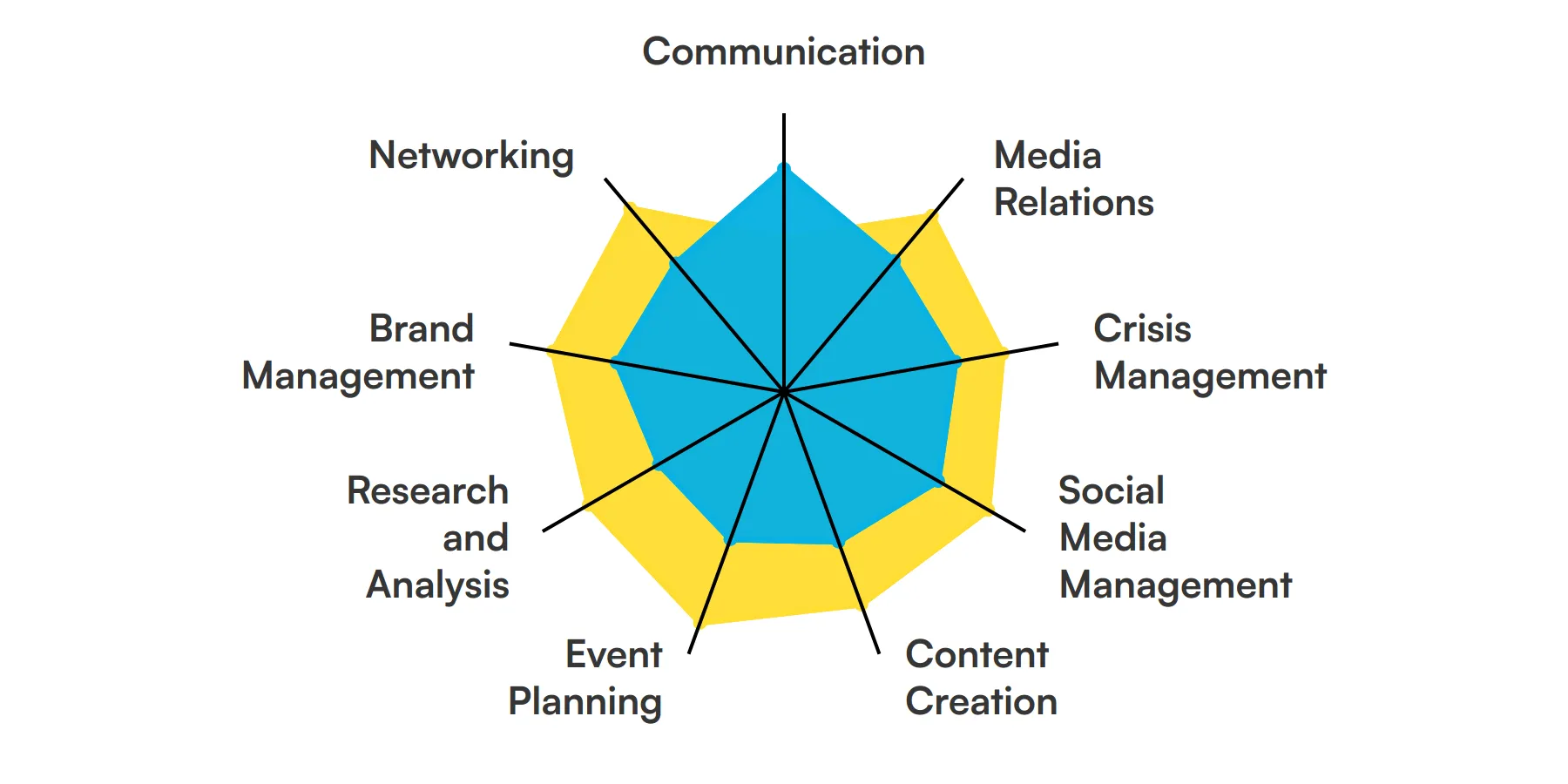
Communication
Public relations professionals must excel in both written and verbal communication. They craft press releases, pitch stories to media outlets, and communicate with clients to ensure messages are clear and effective.
For more insights, check out our guide to writing a Communications Manager Job Description.
Media Relations
Building and maintaining relationships with journalists and media outlets is key. This skill helps PR professionals secure coverage and manage media inquiries, ensuring positive representation of their clients.
Crisis Management
Handling unexpected events and negative publicity requires quick thinking and strategic planning. PR professionals use this skill to mitigate damage and maintain a positive public image during crises.
Social Media Management
Managing a brand's presence on social media platforms is crucial. This involves creating content, engaging with followers, and monitoring online conversations to maintain a positive image.
Content Creation
Creating engaging and relevant content for various platforms is essential. This includes writing blog posts, creating videos, and designing infographics to communicate the client's message effectively.
Check out our guide for a comprehensive list of interview questions.
Event Planning
Organizing events such as press conferences, product launches, and community outreach programs is a key part of PR. This skill ensures events run smoothly and achieve their intended goals.
Research and Analysis
Understanding market trends, audience behavior, and media landscapes is vital. PR professionals use research to inform their strategies and measure the effectiveness of their campaigns.
Brand Management
Maintaining and enhancing a client's brand image is a core responsibility. This involves consistent messaging, visual identity, and reputation management across all platforms.
For more insights, check out our guide to writing a Brand Manager Job Description.
Networking
Building a strong network of industry contacts, influencers, and media professionals is crucial. Networking helps PR professionals stay informed and create opportunities for their clients.
11 secondary Public Relations skills and traits
The best skills for Public Relationss include SEO Knowledge, Graphic Design, Public Speaking, Project Management, Email Marketing, Photography, Video Production, Copywriting, Data Analysis, Cultural Awareness and Time Management.
Let’s dive into the details by examining the 11 secondary skills of a Public Relations.
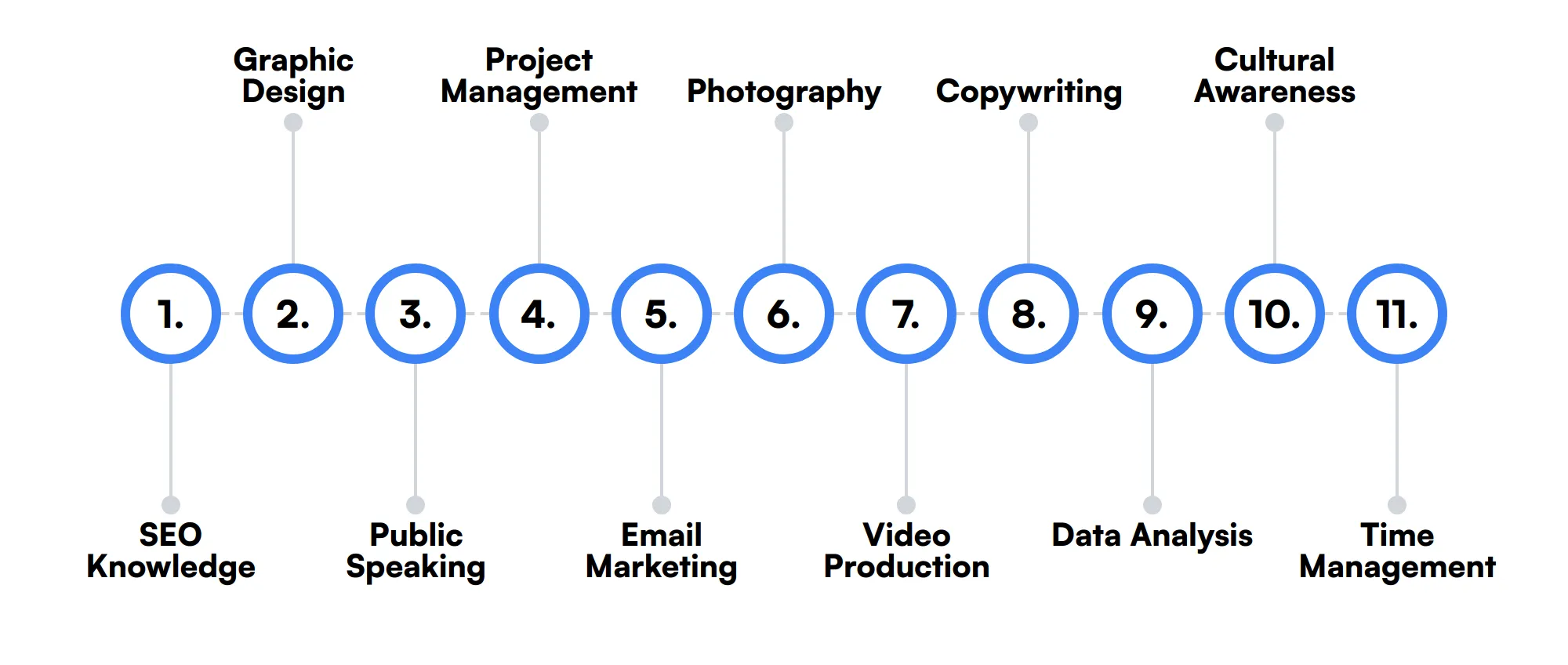
SEO Knowledge
Understanding search engine optimization helps PR professionals increase the visibility of their content online. This skill ensures that press releases and articles reach a wider audience.
Graphic Design
Basic graphic design skills can be beneficial for creating visually appealing content. This includes designing social media posts, infographics, and promotional materials.
Public Speaking
Being comfortable speaking in public is important for PR professionals. This skill is useful for delivering presentations, speaking at events, and representing clients in media interviews.
Project Management
Managing multiple projects and deadlines is a common aspect of PR work. Strong project management skills help professionals stay organized and ensure timely delivery of campaigns.
Email Marketing
Creating and managing email campaigns can help PR professionals reach their target audience effectively. This skill involves crafting compelling emails and analyzing their performance.
Photography
Basic photography skills can enhance a PR professional's ability to capture high-quality images for press releases, social media, and events. Good visuals can significantly boost engagement.
Video Production
Creating video content is increasingly important in PR. Basic video production skills enable professionals to produce engaging videos for social media, websites, and other platforms.
Copywriting
Writing persuasive and compelling copy is a valuable skill. This includes crafting headlines, taglines, and promotional content that captures the audience's attention.
Data Analysis
Analyzing data from various sources helps PR professionals measure the success of their campaigns. This skill involves interpreting metrics and making data-driven decisions.
Cultural Awareness
Understanding and respecting cultural differences is important in global PR. This skill helps professionals create inclusive campaigns that resonate with diverse audiences.
Time Management
Efficiently managing time is crucial for handling multiple tasks and deadlines. Strong time management skills ensure that PR professionals can deliver high-quality work consistently.
How to assess Public Relations skills and traits
Assessing Public Relations (PR) skills and traits involves more than just reviewing resumes and cover letters. It's about understanding how well a candidate can navigate the multifaceted world of PR, from communication and media relations to crisis management and social media management. Each of these skills plays a significant role in a PR professional's ability to build and maintain a positive public image for their clients or organization.
Traditional hiring methods often fall short in evaluating these nuanced skills. This is where skills-based assessments come into play. By using tools like Adaface assessments, you can gain a clearer picture of a candidate's capabilities, leading to a 2x improved quality of hires and an 85% reduction in screening time. These assessments can help you evaluate key PR skills such as content creation, event planning, research and analysis, brand management, and networking, ensuring you find the right fit for your team.
Let’s look at how to assess Public Relations skills with these 3 talent assessments.
Communication Skills Test
Our Communication Skills Test evaluates candidates' communication skills, including verbal and written communication, active listening, and interpersonal skills. It is designed to assess their ability to effectively communicate with customers, colleagues, and stakeholders in various professional scenarios.
The test assesses their understanding of communication skills, situational judgement, attention to detail, critical thinking, and verbal reasoning. Candidates navigate through realistic scenarios that require them to demonstrate their ability to communicate clearly and effectively.
Successful candidates show proficiency in handling various communication challenges, making sound judgements in situational contexts, and demonstrating strong attention to detail and critical thinking abilities.
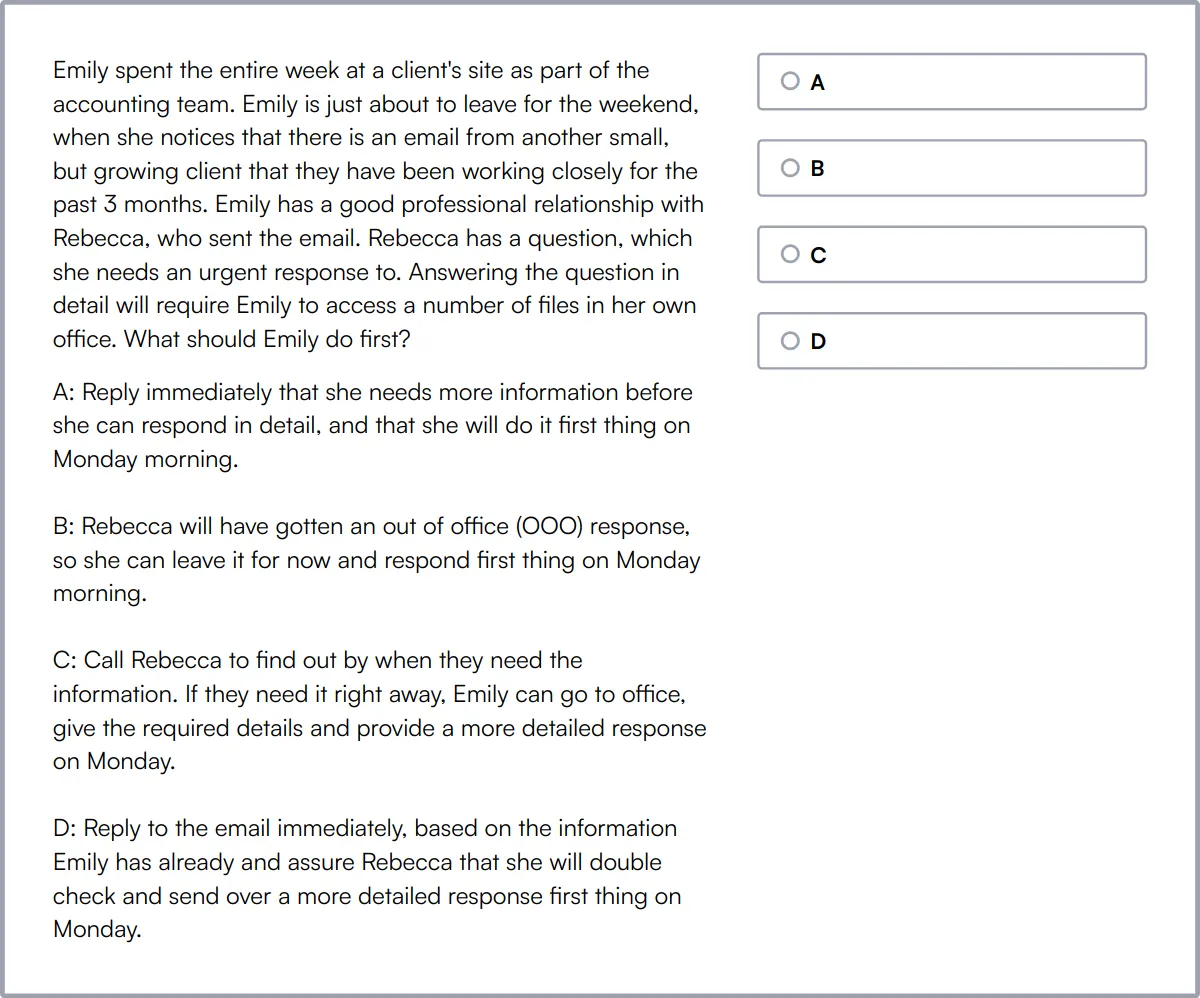
Digital Marketing Test
Our Digital Marketing Test evaluates a candidate's ability in SEO, inbound marketing, email marketing, distribution channels, paid ads, analytics, and end-user insight using real-life scenario-based questions.
The test covers social media marketing, search engine optimization, search engine marketing, ecommerce marketing, Google paid ads, Google Analytics, email marketing, mobile marketing, ad servers, and social media analytics. Candidates are tested on their ability to strategize and execute digital marketing campaigns effectively.
High-scoring candidates demonstrate a deep understanding of digital marketing principles, including the ability to analyze data, optimize campaigns, and utilize various digital marketing tools and platforms.
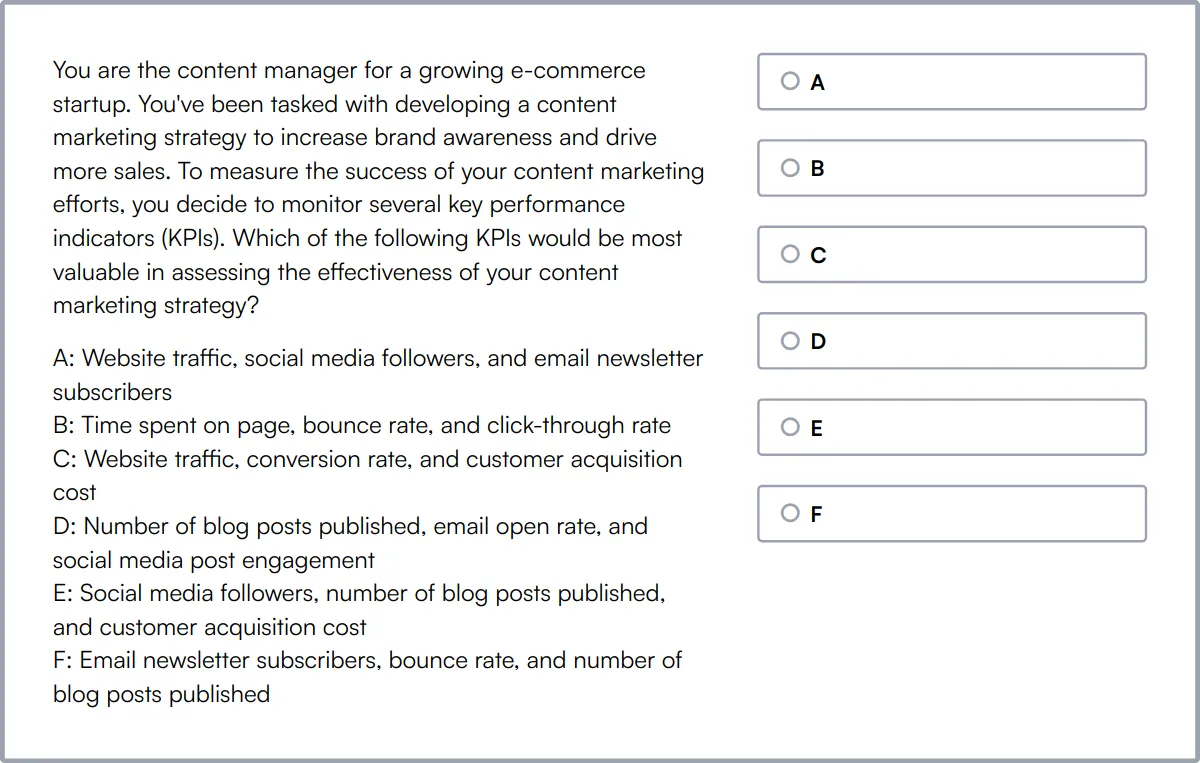
Content Strategy Test
Our Content Strategy Test evaluates candidates' knowledge and skills in developing effective content strategies for digital platforms. It assesses their abilities in areas such as audience analysis, content planning, information architecture, and user experience optimization.
The test covers understanding and defining target audience, content auditing, content gap analysis, developing a content strategy, keyword research and SEO, content creation, content calendar development, content performance measurement, understanding content lifecycle, multichannel content strategy, content governance, crisis communication, and user experience (UX) and content strategy.
Candidates who perform well on this test show proficiency in creating and managing content strategies that align with business goals, engage target audiences, and optimize user experience across multiple channels.
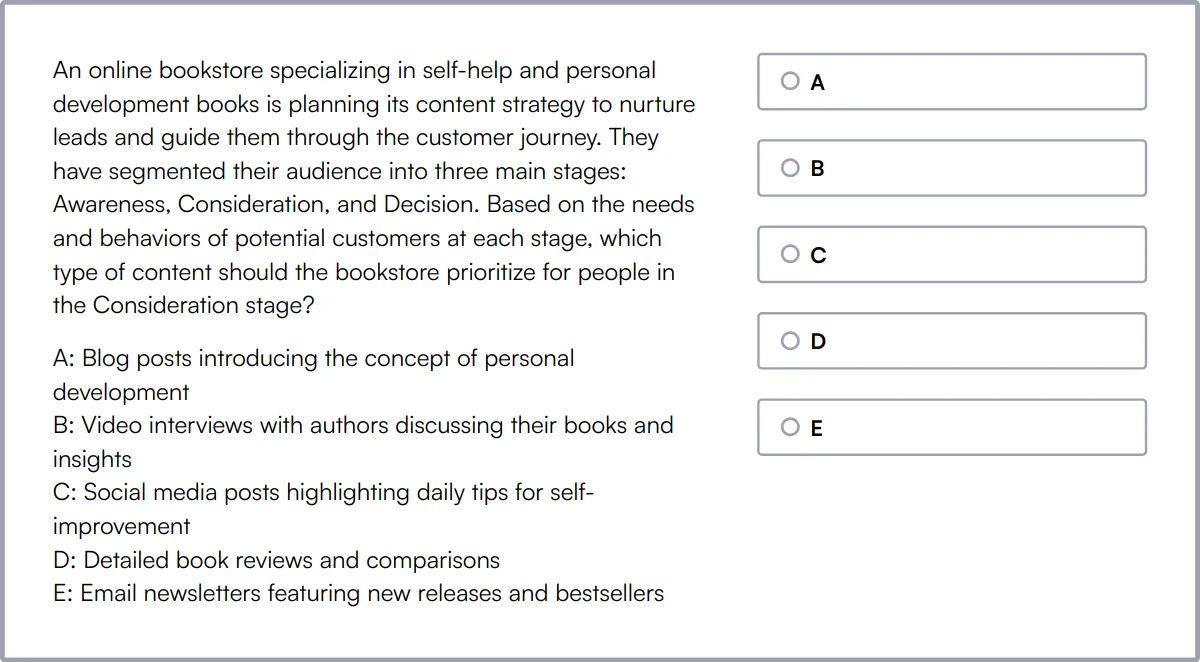
Summary: The 9 key Public Relations skills and how to test for them
| Public Relations skill | How to assess them |
|---|---|
| 1. Communication | Evaluate clarity and effectiveness in conveying messages. |
| 2. Media Relations | Assess ability to build and maintain media contacts. |
| 3. Crisis Management | Check skills in handling and mitigating public relations crises. |
| 4. Social Media Management | Gauge proficiency in managing and engaging on social platforms. |
| 5. Content Creation | Review quality and creativity of produced content. |
| 6. Event Planning | Assess organizational skills in planning and executing events. |
| 7. Research and Analysis | Evaluate ability to gather and interpret relevant data. |
| 8. Brand Management | Check consistency and effectiveness in maintaining brand image. |
| 9. Networking | Gauge ability to build and maintain professional relationships. |
Communication Skills Test
Public Relations skills FAQs
What are the key communication skills needed in a public relations role?
Strong verbal and written communication skills are paramount. This includes clarity in conveying messages, adeptness in tailoring messages for different audiences, and proficiency in various communication platforms.
How can recruiters assess a candidate's expertise in media relations?
Assessing a candidate's media relations skills can be done by reviewing their past media campaigns, asking for specific examples of strategies they have implemented, and their results. Role-playing scenarios can also provide insight into their approach.
What makes an effective crisis management strategy in public relations?
An effective crisis management strategy involves quick thinking, calmness under pressure, and a proactive approach to communication. It's important to evaluate how a candidate plans and responds to hypothetical crisis scenarios.
Why is social media management important for public relations?
Social media management is crucial for engaging with audiences, managing brand reputation, and responding to feedback in real-time. It's a direct line to the public and a key tool for shaping public perception.
How can event planning skills be assessed during the recruitment process?
To assess event planning skills, recruiters can ask candidates to describe past events they have organized, focusing on their role, the challenges faced, and the outcomes. Requesting portfolios or case studies can also be useful.
What role does SEO knowledge play in public relations?
SEO knowledge helps in crafting content that not only communicates the intended message but also ensures it reaches the widest possible audience through higher search engine rankings. Candidates should understand SEO basics and how they integrate with PR strategies.
How important is cultural awareness in public relations?
Cultural awareness is key in public relations to ensure that communications are appropriate and respectful across diverse audiences. It helps in building and maintaining a positive brand image globally.
What are some effective ways to test public speaking skills in potential PR hires?
Public speaking skills can be evaluated by conducting in-person or virtual presentations as part of the interview process. Observing how candidates handle questions and interact with an audience provides valuable insights into their abilities.

40 min skill tests.
No trick questions.
Accurate shortlisting.
We make it easy for you to find the best candidates in your pipeline with a 40 min skills test.
Try for freeRelated posts
Free resources



